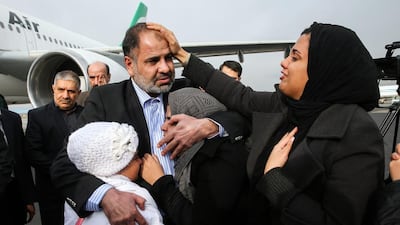TEHRAN // An Iranian diplomat held hostage in Yemen for nearly two years was rescued in a military operation and returned to Tehran on Thursday.
Deputy foreign minister Hossein Amirabdolahian said intelligence officers undertook a “difficult and complicated operation” to secure Nour Ahmad Nikbakhat’s freedom from the “hands of terrorists”.
It was a rare acknowledgement by Tehran of an intel operation carried out on foreign soil.
Mr Amirabdolahian also said the operation – carried out by a team of special operatives – took place “in a very special area in Yemen”. He did not provide further details.
Iranian state television broadcast images of the diplomat arriving at Mehrabad airport on Thursday, welcomed by Iranian officials, his family and relatives.
“I was kidnapped by unknown gunmen and terrorists as I left my home to go to work,” Mr Nikbakht said.
He said “many efforts were made by soldiers from [Iran’s secret services], the intelligence ministry and the foreign ministry” to secure his release.
In July 2013, armed men stopped Mr Nikbakhat’s car as he was driving in Sanaa, forced him into their vehicle and sped away. No one claimed responsibility but the abduction was blamed on Al Qaeda-linked militants. The diplomat’s name was not disclosed at the time.
Iran’s intelligence minister, Mahmoud Alavi, said his officers carried out the operation to free Mr Nikbakhat at “minimum cost” and without giving in to the aductors’ demands – a comment that suggests there had been negotiations over the diplomat’s fate.
In January 2014, another Iranian diplomat in Sanaa – economic attache Ali Asghar Asadi – was killed in a drive-by shooting in a busy commercial district.
Yemeni security officials said their investigation suggested the gunmen first attempted to kidnap Asadi by stopping his car. When the diplomat resisted, the assailants shot him and fled the area.
At the time, relations between Iran and Yemen had soured over what Sanaa called Iranian meddling in its domestic affairs.
Yemen’s government and neighbouring Saudi Arabia accused Tehran of supporting Shiite rebels in the country’s north in an alleged effort to destabilise the impoverished Arabian Peninsula nation. Iran has dismissed the accusations.
Last year, the Shiite rebels known as the Houthis spread from their northern heartlands and fought their way across Yemen, seizing the capital of Sanaa last September, and several surrounding provinces.
The crisis has threatened to split Yemen and push the country into full-blown sectarian warfare.
Though Tehran denies any military backing of the Houthis, Arab Gulf countries are unnerved by Iran’s increasing assertiveness in the region.
* Agence France-Presse and Associated Press

